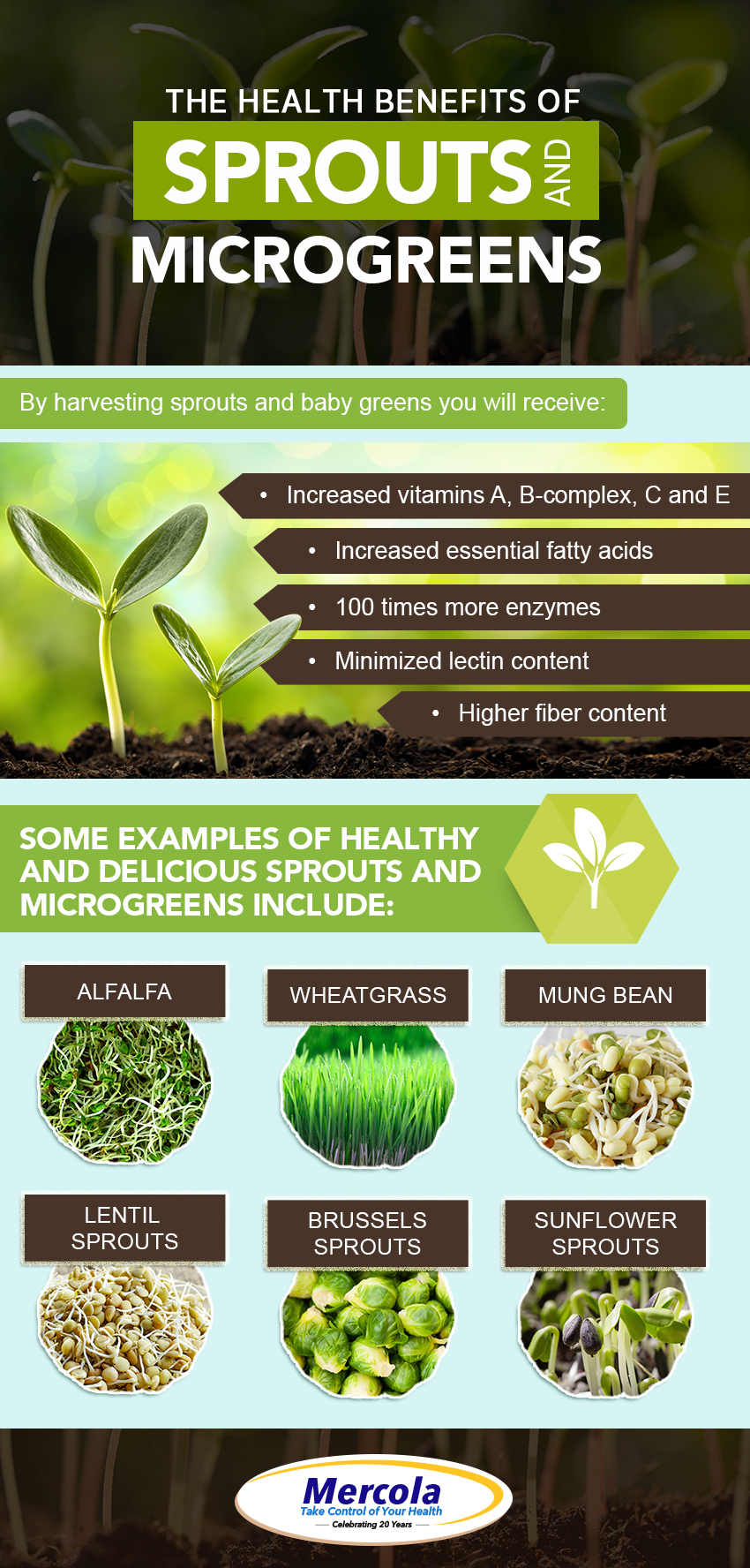Story at-a-glance -
- Sprouts are a true superfood and they're fast and easy to grow. Sprouts have a high nutrient content that offers you impressive health benefits
- Homegrown sprouts can be ready to harvest in a matter of days, offering you a concentrated source of enzymes, vitamins, minerals and other phytochemicals
- The good news is that growing your own sprouts does not require you to look for any available patch of land. Not only are sprouts extremely nutrient-dense and beneficial, but they are also extremely easy to grow
Sprouts are a true superfood and they're fast and easy to grow. Homegrown sprouts can be ready to harvest in a matter of days, offering you a concentrated source of enzymes, vitamins, minerals and other phytochemicals.

The key to achieving stellar health depends on various factors in your life, including getting daily exercise, high-quality sleep and reducing toxins in your environment. However, one of the most influential life factors lies in what you eat. A poor diet brought on by the wide array of bastardized “health” foods in the market have led people towards the path of self-destruction.
The good news is that you don’t have to fall victim to these health traps any longer. Planting and harvesting your own food ensures that you’re getting healthy, naturally grown produce for you and your family. Now, this is made easier and more nutritious because of the discovery of the impressive nutrient content of sprouts.
Health Benefits of Sprouts, Microgreens and Baby Greens
Sprouts, the starting point of a plant, have a high nutrient content – much higher that their mature counterparts. This means that sprouts not only give you an easy-to-acquire option, but it also offers you impressive health benefits. Some of the benefits you’ll surely get include:
- High vitamin and enzyme content. Some sprouts contain about 20 times more vitamin content than their fully grown counterparts. The enzyme content in sprouts can have as much as 100 times more enzyme levels. These enzymes are especially needed for vitamin and mineral absorption.
- Increased essential fatty acids. Sprouts have up to 30 times more fatty acid content than their fully grown variety.
- Bioavailable proteins and minerals. During the sprouting process, the minerals start binding to the proteins, which makes it easier for the body to use these up for essential processes in the body.
Sprouted nuts, beans and grains have also been observed to have significantly lower lectin content as compared to fully grown plants. Sprouting breaks down hormone inhibitors and anti-nutrients as well, with about 90 percent of anti-nutrients getting depleted if the sprouts are soaked before consumption.
Growing Your Own Sprouts Is as Easy as It Is Cost-Effective
Do you live in a housing unit or an apartment complex that limits your options when it comes to gardening and growing your own food? The good news is that growing your own sprouts does not require you to look for any available patch of land. Not only are sprouts extremely nutrient-dense and beneficial, but they are also extremely easy to grow.
Growing your own sprouts also ensures that you don’t get exposed to the harmful chemicals and toxins that are commonly used in conventional farming. Sprouts that are available in the market are widely known to be very susceptible to bacterial contamination, where the bacteria is incorporated into the sprout itself and cannot be removed by washing alone.
Sprouts can be grown with or without soil. You can use a 10x10-inch tray to grow your sprouts, which will help you harvest more sprouts at one time. Place the tray near a window where the sprouts can get enough sunlight.
What Types of Sprouts Can You Grow on Your Own?
First of all, sprouts, microgreens and baby greens belong to the same category, but are harvested at different periods. Sprouts are harvested a few days or a week after planting, microgreens are harvested after two to three weeks, and baby greens are harvested after four weeks. Some of the best sprouts and microgreens you can grow and harvest are:
|
Red cabbage: These microgreens have been observed to contain high amounts of ascorbic acid or vitamin C.
|
Green daikon radish: This is rich in tocopherols or vitamin E compounds
|
|
Cilantro: Cilantro microgreens contain high amounts of lutein and beta-carotene – three times more than fully-grown cilantro plants.
|
Broccoli sprouts: They contain as much as 100 times more sulforaphane than mature broccoli, a compound that has anti-cancer properties.
|
|
Garnet amaranth: Garnet amaranth microgreens have high amounts of phylloquinone or vitamin K.
|
Alfalfa: High in saponin levels, alfalfa sprouts help in normalizing cholesterol levels and improving bone strength.
|
|
Sunflower sprouts: The high amounts of phytosterols in sunflower sprouts help regulate cholesterol and low-density lipoproteins.
|
|
Other sprouts and microgreens you can easily grow on your own include:
Incorporating nutrient-dense foods into your diet doesn’t have to be difficult. Growing your own supply of sprouts and microgreens is just one of the ways you can do it. When you combine these healthy greens with other nutritious foods, you can surely get your fair share of vitamins, minerals and enzymes that your body needs, minus the fear of chemical and toxin exposure. Not only will you become more self-sustainable, you also have the opportunity to watch your own food grow in front of your eyes.
Click Here to Learn More About the Health Benefits of Sprouts